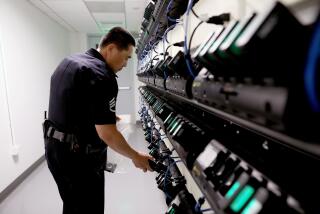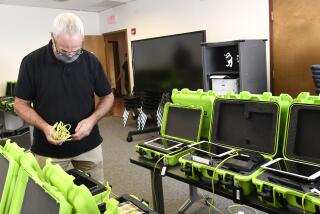Scientists Give the Lie to Polygraph Testing
- Share via
Polygraph testing for national security screening is little more than junk science, with results so inaccurate that they tend to be counterproductive, according to a long-awaited report released Tuesday by the National Academy of Sciences.
The nation’s premier scientific organization said such tests, a key counterespionage tool for 50 years, promote false confidence that spies and other national security threats have been ferreted out.
Produced by experts in psychology, engineering, law and other fields, the report confirms long-standing doubts about the validity of polygraph testing that led to a 1988 federal law banning the use of such tests for employment screening in most private businesses.
Polygraph results are also inadmissible as evidence in nearly all state courts, with federal courts leaving the decision up to the judges.
“If logic has anything to do with it, then the report will have a major policy impact,” said Steven Aftergood, an intelligence analyst with the Federation of American Scientists.
“I don’t think federal agencies stop and ask themselves how many spies have we caught with this--because the answer is ‘none’--or how many people have been unfairly denied employment, because the answer is ‘many.’ ”
Federal security agencies would not discuss the report’s conclusions Tuesday, saying they needed time to review the 333-page report in detail.
The U.S. government subjects thousands of job applicants or employees in sensitive positions to “lie detector” tests each year.
The CIA and the National Security Agency administer polygraph tests to all job applicants and employees. The FBI and the Defense Department also test extensively, particularly since last year’s terrorist attacks. Such screenings are also common at large police departments nationwide.
“The polygraph has been, and continues to be, one of a number of useful tools in the applicant screening process,” said CIA spokesman Paul Nowack.
Linton Brooks, acting head of the National Nuclear Security Administration--the agency responsible for the United States’ nuclear weapons stockpile--said the agency will reassess its use of polygraphs in light of the new report.
“It is used not on a stand-alone basis but as part of a larger fabric of investigative and analytical reviews to help security personnel determine who should have access to classified information,” Brooks said.
A Pentagon spokesperson said the Defense Department has valued the polygraph “as an investigative tool” for half a century, but agrees that further research would be valuable.
Some experts say the wide-ranging and authoritative report, which was prepared by the academy’s research council based on 19 months of study, could trigger changes in security practice for agencies that depend on polygraph testing.
“It is going to be a watershed” that shifts the burden of proof from polygraph skeptics to its advocates, said Paul Giannelli, a law professor at Case Western Reserve University and a consultant to the national academy panel.
“The report is so devastating that it will affect all uses of the polygraph,” he said, noting that the panel concluded that the government has “wasted millions of dollars and ought to go in a different direction.”
However, advocates of polygraph screening were unsurprised by the study’s conclusions. They disagree that profound changes in security strategy are warranted during a war on terrorism that often comes down to fuzzy questions of intent.
“Although it is clearly not a perfect screening tool ... nothing has come along that people have felt good enough about to replace the polygraph,” said Michael O’Neil, former general counsel of the CIA.
“That’s why it is not an exclusive tool” but one of several methods to determine security clearances, he said.
Other national security veterans concurred.
“It’s one of the few tools you have that coerces more candor than the person offers up voluntarily, that a civilized society finds acceptable,” said Stewart Baker, a former general counsel of the National Security Agency.
He added that the report should be considered carefully, but that the real-world experience of intelligence agencies may trump an academic analysis.
The study was underwritten by the Department of Energy, which was embarrassed by contradictory interpretations of polygraph tests on accused nuclear spy Wen Ho Lee in 1998 and 1999.
The Taiwanese-born scientist pleaded guilty to one felony charge, but he was ultimately exonerated of spying, and the furor over his case indirectly prompted the polygraph study.
The 2002 national defense authorization bill now requires the Department of Energy to revise its current polygraph policy--under which about 2,000 employees are tested annually--based on a review of this new study.
Many people often assume that polygraph machines literally detect lies. Actually, they measure changes in physiological signals--blood pressure, heart and breathing rates, and perspiration--thought to characterize deception.
Only trained operators can interpret the results, and their conclusions are often more art than science.
Reviewing a century of experience, the research panel found that technicians can sometimes detect deceptive responses to questions involving specific incidents, such as, “Were you at the bank robbery on Oct. 9, 2002?” But the method shows scant reliability for general use in employment or security screening, particularly with spies or criminals trained to defeat the testing procedure.
“Polygraph testing yields an unacceptable choice for DOE employee security screening between too many loyal employees falsely judged deceptive and too many major security threats left undetected,” the report noted.
Naive faith in the power of the polygraph leads some subjects to confess, or to avoid committing crimes for fear that they will be found out, experience suggests.
“However, overconfidence in the polygraph--a belief in its accuracy that goes beyond what is justified by the evidence--also presents a danger to national security,” the panel concluded.
Despite the reliance of the national security apparatus on polygraph testing, virtually no serious research about its efficacy has been conducted.
“If there is a decision made to continue polygraph testing, it would have to be made on the untested belief that the benefits of deterrence and confessions” offset the vast cost of testing and the negative effect on thousands of falsely suspected subjects, said Richard M. Shiffrin, an author of the report and a professor of psychology at Indiana University.
Experts say the debate over polygraph testing reflects a general problem with forensic science--a field developed by law enforcement practitioners outside mainstream science.
“They look for something useful, quick and persuasive in court, but they don’t approach their task with the same self-scrutiny and analytic rigor we find in other areas of science,” said William C. Thompson, a criminology professor at UC Irvine.
He called the validation of many forensic techniques, such as ballistics, carpet-fiber, fingerprint and hair-matching, “ridiculously bad.” Those methods are facing increasing scrutiny in legal proceedings.
“The forensic sciences are really not sciences at all,” Thompson said. “They are a service industry for law enforcement ... more like a trade guild that is selling a product.”
But he noted that forensic techniques--including polygraph testing--can be improved with rigorous research.
More to Read
Sign up for Essential California
The most important California stories and recommendations in your inbox every morning.
You may occasionally receive promotional content from the Los Angeles Times.













